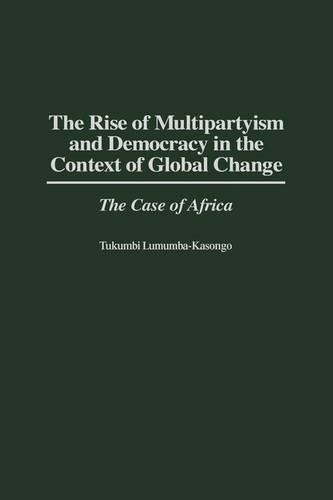
The Rise of Multipartyism and Democracy in the Context of Global Change: The Case of Africa
(Hardback)
Publishing Details
The Rise of Multipartyism and Democracy in the Context of Global Change: The Case of Africa
By (Author) Tukumbi Lumumba-Kasongo
Bloomsbury Publishing PLC
Praeger Publishers Inc
20th August 1998
United States
Classifications
Tertiary Education
Non Fiction
Political structures / systems: democracy
African history
321.8096
Physical Properties
Hardback
168
Description
Lumumba-Kasongo examines those forces that contributed to the fate of multiparty democracy in Africa. The forces include the state, political parties, ethnicity, nationalism, religion, underdevelopment, and the global market. Multipartyism in Africa is not necessarily democratic. However, the processes toward multipartyism can produce democratic discourses if they can be transformed by popular and social movements. As the author points out, almost all social classes have demanded some form of democracy. Yet the sociological meanings and teleological perspectives of those forms of democracy depend on an individual or group's economic and educational status. The dynamics of the global context, as reflected in the adoption of the structural adjustment programs of the World Bank and the stability programs of the International Monetary Fund, are likely to produce non-democratic conditions in Africa. Lumumba-Kasongo challenges the existing paradigms on democracy and development, so the book is of considerable interest to scholars and policy makers involved with African politics and socio-economic development.
Reviews
The value of this study lies in the author's authenticity as an African intellectual and his deep knowledge of a few African countries. Upper-division undergraduates and above.-Choice
Tukumbi Lumumba-Kasongo has written a very informative and provocative book. Indeed, it enriches our understanding of democratic practices and values far beyond Africa. It is an excellent source in the study of democracy in general and African politics in particular. No doubt, many will disagree with the author's premise, vision of relevant democracy, and policy recommendations. Regardless, this volume is a refreshing alternative to the many books that attempt to assess the progress or lack of progress in Africa's democratization process by measuring how many multiparty elections have taken place. Even those who would strongly disagree with the author are likely to find this book challenging and packed with valuable information.-American Political Science Review
"The value of this study lies in the author's authenticity as an African intellectual and his deep knowledge of a few African countries. Upper-division undergraduates and above."-Choice
"Tukumbi Lumumba-Kasongo has written a very informative and provocative book. Indeed, it enriches our understanding of democratic practices and values far beyond Africa. It is an excellent source in the study of democracy in general and African politics in particular. No doubt, many will disagree with the author's premise, vision of relevant democracy, and policy recommendations. Regardless, this volume is a refreshing alternative to the many books that attempt to assess the progress or lack of progress in Africa's democratization process by measuring how many multiparty elections have taken place. Even those who would strongly disagree with the author are likely to find this book challenging and packed with valuable information."-American Political Science Review
Author Bio
TUKUMBI LUMUMBA-KASONGO is Herbert J. Charles and Florence Charles Faegre Professor of Political Science at Wells College, Senior Fellow at the Institute for African Development at Cornell University, Visiting Scholar in the Department of City and Regional Planning at Cornell University, and Director of CEPARRED. He has taught throughout Africa and the United States and has published extensively on international relations, social movements, and structural adjustments in Africa. He is the author of The Dynamics of Economic and Political Relations Between Africa and Foreign Powers: A Study in International Relations (Praeger, 1998).
